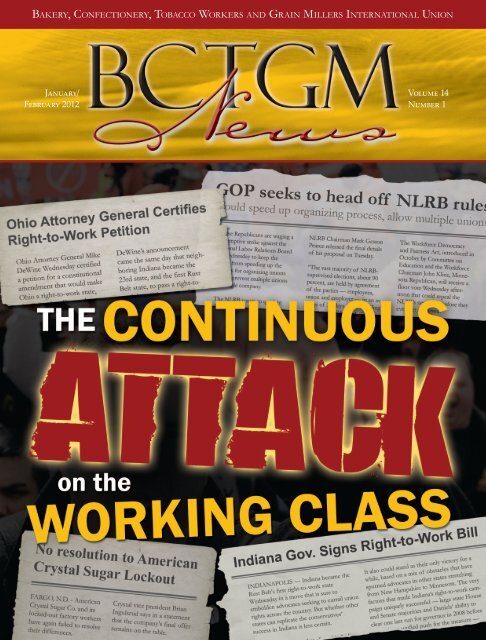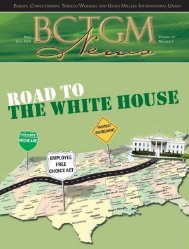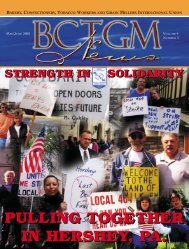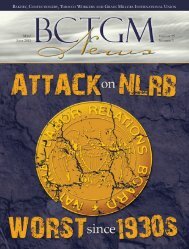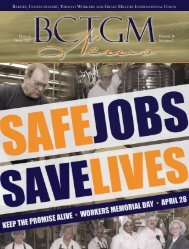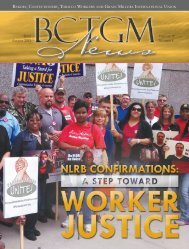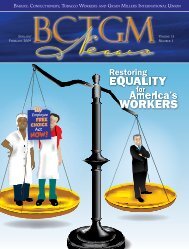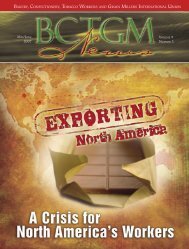to download a printable PDF - BCTGM
to download a printable PDF - BCTGM
to download a printable PDF - BCTGM
Create successful ePaper yourself
Turn your PDF publications into a flip-book with our unique Google optimized e-Paper software.
Bakery, Confectionery, Tobacco Workers and Grain Millers International Union<br />
January/<br />
February 2012<br />
Volume 14<br />
Number 1
the PRESIDENT’S MESSAGE<br />
2012 |<br />
AAs we begin the new year,<br />
the immediate challenges that<br />
lie ahead for the <strong>BCTGM</strong> are<br />
as daunting as any this Union<br />
has faced in its long and proud<br />
his<strong>to</strong>ry. Many employers in<br />
our industries are pursuing<br />
a destructive strategy of “my<br />
way or the highway” in their<br />
relationship with our Union.<br />
Tragically, the 1,300 <strong>BCTGM</strong> members at American<br />
Crystal Sugar remain locked out of the jobs they want <strong>to</strong><br />
return <strong>to</strong>; jobs they so ably performed with professionalism<br />
and diligence for many years.<br />
For more than six months, Crystal CEO Dave<br />
Berg has thumbed his nose at our members and their<br />
communities, as well as the Minnesota governor, the state’s<br />
two U.S. sena<strong>to</strong>rs and numerous U.S. representatives. Berg<br />
is presiding over a company that has now joined the ranks<br />
of this nation’s worst corporate outlaws.<br />
Through the years, lawmakers have realized that<br />
workers standing <strong>to</strong>gether in solidarity will lead <strong>to</strong><br />
greater fairness and justice in the workplace. Therefore,<br />
lawmakers— the majority of whom are controlled by<br />
corporate money— use every bit of influence they have<br />
<strong>to</strong> impede labor solidarity and skew the laws in favor of<br />
management.<br />
While our members at Crystal Sugar remain strong<br />
during their bitter struggle, more than 5,000 <strong>BCTGM</strong><br />
members employed at Hostess Brands face a very uncertain<br />
future. The recent bankruptcy filing by this company,<br />
the largest employer of <strong>BCTGM</strong> members, will clearly<br />
show before the process is over that the bankruptcy laws<br />
in this country exist <strong>to</strong> protect the bankrupt company, its<br />
executives and Wall Street inves<strong>to</strong>rs with no regard for a<br />
company’s active or retired employees.<br />
Knowing that it has the upper hand in bankruptcy<br />
proceedings, Hostess has put forward demands <strong>to</strong> radically<br />
alter the present collective bargaining agreements. These<br />
demands are outrageous and unnecessary.<br />
We have been left with no choice but <strong>to</strong> stand<br />
and fight for the benefits and standards that we have<br />
negotiated since the beginning of our collective bargaining<br />
relationship with Hostess and its predecessor companies.<br />
In every set of negotiations with this company<br />
throughout the years, workers have deferred wages in order<br />
<strong>to</strong> build a secure future in their retirement only <strong>to</strong> see<br />
Hostess make a unilateral decision <strong>to</strong> cease its contractually<br />
obligated contributions <strong>to</strong> every pension plan in which its<br />
employees participate, including the B&C Fund, the largest<br />
of these pension funds.<br />
The <strong>BCTGM</strong> is deeply offended by the company’s<br />
false claim that its financial woes are the result of its union<br />
contracts and pension obligations. This company is in<br />
dire financial shape because of a string of failed business<br />
decisions made by a series of ineffective executives who<br />
have been running this company for the past decade.<br />
Multiple CEO’s with no experience in the bread and<br />
cake baking business implementing constantly-changing<br />
business plans that lack creativity and vision is the heart<br />
of this bankruptcy. For more than a decade, this company<br />
a year of<br />
“I know that corporate<br />
greed and immorality cannot<br />
break the iron will and<br />
battle-tested solidarity that<br />
bind this Union <strong>to</strong>gether.”<br />
IMMENSE CHALLENGE<br />
has squandered the talents and experience of a<br />
dedicated, skilled workforce.<br />
The hedge funds and private equity firms<br />
that gain control of companies like Hostess have<br />
no loyalty <strong>to</strong> the employees, active or retired.<br />
They could not care less that the employees of<br />
Hostess will have <strong>to</strong> endure the consequences<br />
of their greed. They only care about making<br />
money.<br />
I want <strong>to</strong> assure all of our members at<br />
Hostess that we will do everything possible <strong>to</strong> represent<br />
your interests and those of this International Union during<br />
this painstaking process.<br />
And <strong>to</strong> our members at companies with which we will<br />
be in negotiations this year, such as Kraft and Kellogg,<br />
I want <strong>to</strong> assure you that the leadership team heading up<br />
these negotiations will uphold the highest standards that<br />
are the hallmark of <strong>BCTGM</strong> contracts, regardless of any<br />
adverse bargaining tactics companies might employ.<br />
The impact on our Union of this new, renegade<br />
corporate mentality has been harsh, inflicting enormous<br />
pain on many of our members. In all honesty, I must say<br />
that the road ahead will likely get more difficult for a while.<br />
Nonetheless, I am certain that our Union will<br />
effectively meet these immense challenges and emerge<br />
from this s<strong>to</strong>rm intact and, in some ways, as an even<br />
stronger Union.<br />
I am confident in this outcome because I have the<br />
greatest faith in our members, our local union leadership<br />
and our International Union officers and staff who stand<br />
by my side.<br />
Above all, I know that corporate greed and immorality<br />
cannot break the iron will and battle-tested solidarity that<br />
bind this Union <strong>to</strong>gether.<br />
Frank Hurt<br />
<strong>BCTGM</strong> International President<br />
<strong>BCTGM</strong> News<br />
Official Publication of the Bakery, Confectionery, Tobacco<br />
Workers and Grain Millers International Union<br />
10401 Connecticut Avenue, Kensing<strong>to</strong>n, Maryland 20895-3961<br />
(301) 933-8600<br />
www.bctgm.org<br />
Frank Hurt, Edi<strong>to</strong>r<br />
Corrina A. Christensen, Assistant Edi<strong>to</strong>r<br />
<strong>BCTGM</strong> General Executive Board<br />
President Frank Hurt • Secretary-Treasurer David B. Durkee<br />
Vice Presidents Steve Bertelli • Anthony L. Johnson • Sean Kelly<br />
Micheal T. Konesko • Arthur Montminy • Robert Oakley • Randy Roark<br />
<strong>BCTGM</strong> General Executive Board Members<br />
Joyce Als<strong>to</strong>n • Thomas Bingler • Edward Burpo • Butch Henley<br />
Barry Jenkins • Johnny Jackson • Paul LaBuda • Richard Lewis<br />
Danny Murphy • Vester Newsome • Ron Piercey • Donna Scarano<br />
Brad Schmidt • Doyle Townson<br />
<strong>BCTGM</strong> News (ISSN 1525-4860) is published bi-monthly by the Bakery, Confectionery, Tobacco Workers<br />
and Grain Millers International Union, 10401 Connecticut Avenue, Kensing<strong>to</strong>n, MD 20895-3961. Periodicals<br />
postage paid at Kensing<strong>to</strong>n, MD and at additional mailing offices. Subscription <strong>to</strong> new members<br />
only. Postmaster: Send address changes <strong>to</strong> <strong>BCTGM</strong> News, 10401 Connecticut Avenue, Kensing<strong>to</strong>n, MD<br />
20895-3961.<br />
2 <strong>BCTGM</strong> News
The<br />
RISE<br />
of the<br />
From the Roquette corn<br />
milling facility in Keokuk,<br />
Iowa, <strong>to</strong> American Crystal<br />
Sugar in the Red River Valley of<br />
Minnesota and North Dakota and<br />
Cooper Tires in Findlay, Ohio,<br />
employers are turning <strong>to</strong> lockouts<br />
as a tactic <strong>to</strong> force union workers<br />
<strong>to</strong> accept major concessions when<br />
contract negotiations deadlock.<br />
For the <strong>BCTGM</strong>, the lockout<br />
of 1,300 workers at American<br />
Crystal Sugar is the most glaring<br />
example of the lengths <strong>to</strong> which<br />
employers will go <strong>to</strong> bust the<br />
union. On August 1, American<br />
Crystal – the nation’s largest<br />
sugar beet processor – locked out<br />
<strong>BCTGM</strong> members at facilities<br />
in Minnesota, Iowa and North<br />
Dakota. Despite nearly $2 billion<br />
in profits over the last three years,<br />
the company continues <strong>to</strong> demand<br />
that workers agree <strong>to</strong> higher health<br />
benefit payments, outsourcing<br />
jobs and the elimination of other<br />
benefits. When workers refused,<br />
the company locked its doors,<br />
hired 900 replacement workers<br />
and the lockout is now in its<br />
seventh month.<br />
But American Crystal isn’t<br />
alone in its use of the lockout as<br />
a bargaining tactic. In 2010, 240<br />
members of <strong>BCTGM</strong> Local 48G<br />
(Keokuk, Iowa) were locked out by<br />
Roquette at its corn milling facility.<br />
The lockout lasted 10 months<br />
before a new contract<br />
was reached.<br />
Cooper Tire & Rubber Co.<br />
locked out 1,050 United Steel<br />
Workers (USW) November<br />
28 after they rejected massive<br />
concessions. Cooper Tire workers<br />
had taken $31 million in pay and<br />
benefits cuts years earlier <strong>to</strong> keep<br />
the company running through<br />
the recession. When the economy<br />
improved and Cooper Tire started<br />
<strong>to</strong> rake in hundreds of millions of<br />
dollars in profits, the executives<br />
gave themselves huge raises and<br />
bonuses. The workers were asked<br />
<strong>to</strong> give up more, and when they<br />
refused, were locked out.<br />
“Give in <strong>to</strong> us, or lose your<br />
paycheck. The lockout is as simple<br />
and as complicated as this,” notes<br />
<strong>BCTGM</strong> International President<br />
Frank Hurt. “When workers won’t<br />
give up their pensions, pay more<br />
for health care, accept pay cuts<br />
or sacrifice job security – they are<br />
locked out. It is a vicious tactic<br />
used by companies that want <strong>to</strong><br />
bust the union and gain greater<br />
control over its workers. The<br />
lockout is a power play,”<br />
Hurt adds.<br />
Gary Chaison, a professor<br />
of industrial relations at Clark<br />
University in Worcester, Mass.,<br />
<strong>to</strong>ld the New York Times that the<br />
lockout “is a sign of increased<br />
employer militancy. Lockouts were<br />
once so rare they were almost<br />
unheard of. Now, not only are<br />
employers increasingly on the<br />
offensive and trying <strong>to</strong> call the<br />
shots in bargaining, but they’re<br />
backing it up with action – in the<br />
form of lockouts.”<br />
According <strong>to</strong> New York<br />
Times writer Steven Greenhouse,<br />
lockouts have grown <strong>to</strong> represent<br />
a large percentage of the nation’s<br />
work s<strong>to</strong>ppages. Last year, at least<br />
17 employers imposed lockouts,<br />
telling their workers not <strong>to</strong> show<br />
up until they were willing <strong>to</strong> accept<br />
management’s contract offer.<br />
“Lockouts are, and will<br />
always be, things willed in<strong>to</strong> being<br />
exclusively by management.<br />
They are not natural phenomena.<br />
They are never truly unavoidable.<br />
They don’t ‘just happen,’ and they<br />
certainly do not occur because<br />
‘both sides’ are at fault. Lockouts<br />
occur when management believes<br />
that unions are <strong>to</strong>o strong, and<br />
they occur when management<br />
believes that unions are <strong>to</strong>o weak,<br />
and they occur when management<br />
doesn’t want a union <strong>to</strong> exist at<br />
all. Lockouts are not devices of<br />
economic correction. That’s just a<br />
byproduct. Lockouts are<br />
attempts by management <strong>to</strong><br />
exercise control over their<br />
workers,” writes political journalist<br />
Charles Pierce.<br />
January/February 2012 www.bctgm.org 3
WAR ON<br />
WORKERS<br />
CONTINUES in 2012...<br />
n February 1, Indiana<br />
Obecame the 23 rd state—and<br />
the first manufacturing<br />
state—<strong>to</strong> institute a “right<br />
<strong>to</strong> work-for-less” law. Across the<br />
United States, these laws have<br />
depressed wages for union and<br />
non-union workers alike, and have<br />
contributed <strong>to</strong> unsafe working<br />
conditions.<br />
And the attacks on workers<br />
and their unions that began in full<br />
force in 2011 continue with several<br />
other states attempting <strong>to</strong> follow<br />
Indiana’s lead.<br />
On the same day Indiana<br />
passed the right-<strong>to</strong>-work-for-less<br />
measure, an anti-worker group<br />
calling themselves Ohioans for<br />
Workplace Freedom proposed<br />
an amendment <strong>to</strong> the state’s<br />
constitution. At<strong>to</strong>rney General<br />
Mike DeWine certified a petition<br />
for the constitutional amendment<br />
that would keep workers covered<br />
by labor contracts from having <strong>to</strong><br />
join a union or pay dues.<br />
However, Ohio’s Governor<br />
John Kasich has not expressed<br />
interest in making right-<strong>to</strong>-work<br />
a priority, after his similarly<br />
anti-worker Senate Bill 5 got<br />
overwhelmingly rejected last year<br />
at the polls.<br />
IN MINNESOTA<br />
A right-<strong>to</strong>-work constitutional<br />
amendment has been introduced<br />
in the Republican controlled<br />
Minnesota State House. A<br />
constitutional amendment does<br />
not need approval of Democratic<br />
Governor Mark Day<strong>to</strong>n;<br />
instead, if the<br />
House and Senate<br />
approve the measure it heads<br />
<strong>to</strong> voters in the November 6<br />
election. However, Minnesota<br />
working families have an ally in<br />
Governor Mark Day<strong>to</strong>n, who<br />
opposes right-<strong>to</strong>-work although<br />
he doesn’t have the power <strong>to</strong><br />
ve<strong>to</strong> constitutional amendments.<br />
IN MICHIGAN<br />
Right-<strong>to</strong>-work-for-less talk<br />
his<strong>to</strong>rically has never taken<br />
root in Michigan, a union<br />
stronghold where roughly 18<br />
percent of employed workers<br />
now are represented by<br />
labor unions. However,<br />
Republicans control<br />
both chambers<br />
of the Michigan<br />
Legislature and the<br />
state’s administration with<br />
Governor Rick Snyder. Snyder<br />
calls the right-<strong>to</strong>-work debate<br />
“divisive” and says he doesn’t<br />
want legislation sent <strong>to</strong> his<br />
desk. And if Democrats unite<br />
against the measure, it would<br />
be more difficult <strong>to</strong> pass.<br />
4 <strong>BCTGM</strong> News
IN ARIZONA<br />
Arizona’s attack on unions<br />
goes above and beyond all of the<br />
above measures. In fact, recent<br />
media reports say that Arizona’s<br />
Republican Governor Jan Brewer’s<br />
union-busting efforts make those<br />
in Ohio and Wisconsin look<br />
harmless.<br />
Arizona’s teachers and first<br />
responders are under full-frontal<br />
attack, as union-stripping bills<br />
that have been called “Wisconsin<br />
on steroids” are being shuttled<br />
through the legislative process at<br />
whirlwind speed. These bills would<br />
prohibit public-sec<strong>to</strong>r unions from<br />
negotiating pay and benefits, ban<br />
paycheck deductions for union<br />
dues, and ban compensation for<br />
union activities. It’s expected<br />
that they will pass through<br />
both chambers easily due <strong>to</strong><br />
the anti-labor GOP majority in<br />
both. Governor Jan Brewer will<br />
undoubtedly sign them in<strong>to</strong> law. A<br />
Phoenix-based right-wing pressure<br />
group, the Goldwater Institute, and<br />
the American Legislative Exchange<br />
Council (ALEC), are behind the<br />
measures.<br />
The Truth About<br />
Right-<strong>to</strong>-Work-for-Less Laws<br />
RIGHT-TO-WORK-FOR-LESS HURTS EVERYONE<br />
Workers in states with right-<strong>to</strong>-work-for-less laws have a consistently lower quality of life than<br />
in other states—lower wages, higher poverty and infant mortality rates, less access <strong>to</strong> the health<br />
care they need and poorer education for their children.<br />
LOWER WAGES<br />
The average worker in a right-<strong>to</strong>-work state makes about $5,333 a year less than workers in<br />
other states ($35,500 compared with $30,167). 1 Weekly wages are $72 greater in free-bargaining<br />
states than in right <strong>to</strong> work states ($621 versus $549). 2<br />
FEWER PEOPLE WITH HEALTH CARE<br />
21 percent more people lack health insurance in right <strong>to</strong> work states compared <strong>to</strong><br />
free-bargaining states. 3<br />
HIGHER POVERTY AND INFANT MORTALITY RATES<br />
Right <strong>to</strong> work states have a poverty rate of 12.5 percent, compared with 10.2 percent in other<br />
states. 4 Moreover, the infant mortality rate is 16 percent higher in right <strong>to</strong> work states. 5<br />
LOWER WORKERS’ COMPENSATION BENEFITS FOR ON-THE-JOB INJURIES<br />
Maximum weekly worker compensation benefits are $30 higher in free states ($609 versus $579<br />
in right <strong>to</strong> work states. 6<br />
MORE WORKPLACE DEATHS AND INJURIES<br />
According <strong>to</strong> the federal Bureau of Labor Statistics, the rate of workplace deaths is<br />
51 percent higher in states with right <strong>to</strong> work, where unions can’t speak up on behalf of workers. 7<br />
1. Average Annual Pay, 2001 from Bureau of Labor Statistics, State average annual pay for 2000 and 2001and percent change in pay for all<br />
covered workers. URL: http://www.bls.gov/news.release/annpay.t01.htm.<br />
2. Bureau of Labor Statistics.<br />
3. Percent of population lacking health insurance from Current Population Survey, March 2002. Table HI06. Health Insurance coverage status<br />
by state for all people: 2001.<br />
4. Poverty Rate in 2001 from U.S. Census Bureau, Current Population Survey, March 2002. URL: http://ferret.bls.census.gov/macro/032002/<br />
pov/new25_001.htm.<br />
5. O’Leary Morgan, Kathleen, and Scott Morgan, State Rankings 2001. Morgan Quitno Press, 2001.<br />
6. Workers’ Compensation data from the AFL-CIO Department of Safety and Health.<br />
7. Workplace Fatalities from Death on the Job: The Toll of Neglect. AFL-CIO. April, 2002.<br />
(Pho<strong>to</strong> credit, opposite: Lauren Casey, The Statehouse File)<br />
January/February 2012 www.bctgm.org 5
Union Membership<br />
HOLDS STEADY in 2011<br />
Working men and women<br />
want <strong>to</strong> come <strong>to</strong>gether<br />
<strong>to</strong> improve their lives:<br />
That’s the message from January’s<br />
report on 2011 union membership.<br />
Despite an<br />
unprecedented<br />
volley of partisan<br />
political attacks<br />
on workers’ rights<br />
and the continuing<br />
insecurity of<br />
America’s economic crisis, union<br />
membership increased slightly last<br />
year.<br />
On January 27, the Bureau of<br />
Labor Statistics announced that<br />
in 2011, the unionization rate of<br />
employed wage and salary workers<br />
was 11.8 percent, up slightly from<br />
11.9 in 2010. Among private sec<strong>to</strong>r<br />
employees, the rate remained at 6.9<br />
percent.<br />
The data also show that<br />
among full-time wage and salary<br />
workers, the median weekly<br />
earnings of union members<br />
were $938, compared <strong>to</strong> $729<br />
for nonunion workers. Union<br />
women earned median weekly<br />
earnings of $879, an amount 34.6<br />
percent higher than their nonunion<br />
counterparts, who earned just $653<br />
by comparison.<br />
Prior reports prove that union<br />
members have greater access <strong>to</strong><br />
health care, retirement and leave<br />
benefits. The recent numbers make<br />
it clear that union jobs are critical<br />
<strong>to</strong> a strong economy. And a strong<br />
Today’s numbers<br />
make it clear that<br />
union jobs are critical<br />
<strong>to</strong> a strong economy.<br />
economy depends on a strong and<br />
growing middle class.<br />
“Ensuring that all people have<br />
a voice at work and protecting<br />
their right <strong>to</strong> organize and bargain<br />
collectively are<br />
essential for an<br />
America that’s<br />
built <strong>to</strong> last, where<br />
everyone gets a<br />
fair shot, everyone<br />
pays his or her<br />
fair share and everyone plays by<br />
the same rules,” says Secretary of<br />
Labor Hilda Solis regarding the<br />
union membership report.<br />
By the Numbers:<br />
• In 2011, 14.8 million people were in unions.<br />
• Overall union membership increased by 49,000,<br />
including 15,000 new 16- <strong>to</strong> 24-year-old members. An<br />
increase of 110,000 in the private sec<strong>to</strong>r was partially<br />
offset by a decline of 61,000 in the public sec<strong>to</strong>r.<br />
• Public sec<strong>to</strong>r density increased from 36.2% in 2010 <strong>to</strong><br />
37.0% in 2011.<br />
• Private sec<strong>to</strong>r density remained at 6.9%.<br />
The middle class is clearly<br />
stronger when workers join<br />
<strong>to</strong>gether in unions. The power<br />
of unions <strong>to</strong> create prosperity<br />
for all working families is well<br />
recognized: Organized labor is one<br />
of the few voices for the economic<br />
interests of the middle class in our<br />
government. Unions were key <strong>to</strong><br />
creating and protecting the social<br />
safety net (including Social Security<br />
and Medicare) and winning major<br />
legislative vic<strong>to</strong>ries for working<br />
families such as the Equal Pay<br />
Act, the Civil Rights Act, and the<br />
Family and Medical Leave Act.<br />
• The largest increases in union membership were in:<br />
• Construction<br />
• Health care services<br />
• Retail trade<br />
• Primary metals and fabricated metal products<br />
• Hospitals<br />
• Transportation and warehousing<br />
Source: Bureau of Labor Statistics and Center for Economic and Policy Research.<br />
6 <strong>BCTGM</strong> News
2012 International Staff Meetings<br />
Held at Headquarters<br />
ATTENTION<br />
Scholarship Applicants<br />
Organizing, 2012 contract negotiations and the political<br />
landscape in Washing<strong>to</strong>n <strong>to</strong>pped the agenda during staff<br />
meetings held at <strong>BCTGM</strong> International headquarters in January.<br />
Regional Vice Presidents and Representatives from the First,<br />
Second, and Fifth Regions attended the meetings that were led by<br />
International President Frank Hurt and assisted by International<br />
Secretary-Treasurer/Direc<strong>to</strong>r of Organizing David B. Durkee.<br />
The purpose of the meetings is <strong>to</strong> develop a region-by-region<br />
game plan for maximizing organizing opportunities, maintaining<br />
high-quality local union service work and implementing an<br />
effective grassroots political action program in this crucial<br />
election year.<br />
Each International Vice President reviewed the past year,<br />
including local union mergers, contract settlements, arbitrations,<br />
strikes and lockouts. Additionally, the group discussed upcoming<br />
negotiations in each region.<br />
Both Hurt and Durkee stressed the importance of<br />
maintaining solidarity in the face of fierce employer opposition<br />
during contract negotiations. Hurt discussed the present lockout<br />
of 1,300 <strong>BCTGM</strong> members at American Crystal Sugar and<br />
the uncertain future of 5,000 <strong>BCTGM</strong> members employed at<br />
Hostess Brands.<br />
Discussing 2012 contract negotiations, Hurt said, “We will<br />
continue <strong>to</strong> uphold the highest standards that are the hallmark<br />
of <strong>BCTGM</strong> contracts—regardless of the bargaining tactics<br />
companies might employ. We will not back down,” said Hurt.<br />
Similar staff meetings will be held for the Third, Fourth and<br />
Sixth Regions later this spring.<br />
The deadline for applications <strong>to</strong><br />
the <strong>BCTGM</strong> 2012 International<br />
Scholarship program has passed.<br />
All those who submitted an<br />
application prior <strong>to</strong> the January<br />
31 deadline date are reminded <strong>to</strong><br />
submit the following requirements<br />
prior <strong>to</strong> the March 31 deadline for<br />
requirements:<br />
Personal Profile – completed by the<br />
applicant.<br />
Academic Report – completed<br />
by the high school (or college, if<br />
a member). The report should<br />
reflect the first semester grades<br />
for the senior year (or more recent<br />
academic performance, if<br />
a member).<br />
Essay – Each applicant is required<br />
<strong>to</strong> write and submit an essay (250-<br />
500 words) <strong>to</strong> demonstrate your<br />
ability <strong>to</strong> organize thoughts and<br />
express yourself. Your essay may be<br />
one of the following:<br />
Same essay as the essay<br />
requirement from your college<br />
application.<br />
Same essay as the Union Plus<br />
Scholarship application (U.S.<br />
applicants only).<br />
Essay on “Organized Labor’s<br />
Contribution <strong>to</strong> the Welfare of the<br />
People of North America.”<br />
SAT or ACT Scores - (if applicable)<br />
For more information<br />
contact the<br />
<strong>BCTGM</strong> International<br />
Scholarship Office:<br />
(301) 933-8600<br />
January/February 2012 www.bctgm.org 7
The Pride of Philadelpia:<br />
<strong>BCTGM</strong> Local 492<br />
(Philadelphia) members<br />
take tremendous pride in<br />
Tasty Baking Company’s<br />
rich heritage and bright future.<br />
Tasty Baking products have<br />
been well known throughout<br />
the company’s nearly 100 year<br />
his<strong>to</strong>ry for consistent taste,<br />
quality, and freshness. And in<br />
2010, the <strong>BCTGM</strong> Union Label<br />
brought added quality <strong>to</strong> every<br />
product made at the company’s<br />
Philadelphia bakery.<br />
In 1914, a Pittsburgh baker,<br />
Philip J. Baur, and a Bos<strong>to</strong>n egg<br />
salesman, Herbert T. Morris, went<br />
in<strong>to</strong> business in Philadelphia <strong>to</strong><br />
produce baked goods using only<br />
the finest ingredients delivered<br />
fresh daily <strong>to</strong> the bakery. They<br />
insisted on farm fresh eggs,<br />
Grade A creamery butter, real<br />
milk, cocoa, spices, and natural<br />
flavorings.<br />
The products were so good<br />
that Morris’ wife, after trying<br />
some of the samples, said they<br />
were “tasty,” so they eventually<br />
named the business Tasty Baking<br />
Company and came up with the<br />
catchy name, Tastykake.<br />
At ten cents a cake, Morris<br />
sold $28 worth the first day, $222<br />
the first week. By the end of 1914,<br />
gross sales were $300,000.<br />
Machinery was built,<br />
employees were hired, and<br />
routes were expanded. Chocolate<br />
Juniors were the first new product<br />
developed, then they put in<br />
electric ovens for cupcakes. By<br />
8 <strong>BCTGM</strong> News
TastyKake Fun Facts<br />
It would take 14,080 Tastykake individual pies laid end <strong>to</strong> end <strong>to</strong> form a mile.<br />
If one chicken were <strong>to</strong> lay all of the eggs used for one day of production at Tastykake, it would<br />
take that chicken 572 years <strong>to</strong> lay enough eggs.<br />
To build a 3-foot wide sidewalk of Butterscotch Krimpets from Center City, Philadelphia <strong>to</strong><br />
Atlantic City you would need 30,412,800 Krimpets.<br />
To completely cover the Philadelphia Flyers ice hockey rink (60’ x 200’), it would take<br />
172,800 Tastykake Juniors.<br />
Tastykake’s oven is half the length, 150 feet long, of a regulation football field (300 ft).<br />
Tastykake bakes 250,000 pies each day.<br />
You could make almost 8 million peanut butter sandwiches with the same amount of peanut<br />
butter that is used in Kandy Kakes in a year.<br />
Tastykake products use sugar cane and cocoa from Africa’s Ivory Coast; Vanilla from<br />
Madagascar; Cinnamon from Indonesia; Nutmeg from the East and West Indies and Banana<br />
Puree from Ecuador.<br />
The first day of operations in 1914, Tastykake bakers produced<br />
100 cakes. Today, they bake over 4.8 million cakes, donuts,<br />
cookies, and pies each day.<br />
*The above material was reprinted from Tasty Baking Co. website:<br />
www.tastykake.cm/aboutus/funfacts<br />
1918, sales reached $1 million.<br />
By 1930, with the introduction<br />
of Butterscotch Krimpets and<br />
the expansion <strong>to</strong><br />
five buildings,<br />
Tastykake was<br />
selling $6 million<br />
worth of these<br />
new snack cakes.<br />
Krimpets and<br />
cupcakes were the<br />
two best sellers at<br />
two packs for a<br />
nickel.<br />
In the 1930s,<br />
as Americans looked <strong>to</strong>ward<br />
economy, Tasty Baking Company<br />
came up with a revolution:<br />
“We take tremendous<br />
pride in the quality<br />
products we produce<br />
and the <strong>BCTGM</strong> Union<br />
Label is proudly<br />
displayed on all goods<br />
that are baked in<br />
Philadelphia.”<br />
individually packaged<br />
lunchbox-sized pies. And at<br />
a nickel each, they became<br />
immediate hits.<br />
Workers at<br />
Tasty Baking were<br />
without union<br />
representation<br />
throughout the<br />
company’s his<strong>to</strong>ry<br />
until they voted <strong>to</strong><br />
become members<br />
of <strong>BCTGM</strong> Local<br />
492 in August<br />
2010.<br />
“We take tremendous pride in<br />
the quality products we produce<br />
and the <strong>BCTGM</strong> Union Label is<br />
proudly displayed on all goods<br />
that are baked in Philadelphia,”<br />
notes <strong>BCTGM</strong> Local 492 Tasty<br />
Baking Chief Shop Steward Greg<br />
Sadowski, who sent the pho<strong>to</strong>s of<br />
Local 492 members at work in the<br />
Philadelphia bakery featured here<br />
<strong>to</strong> the <strong>BCTGM</strong> NEWS.<br />
January/February 2012 www.bctgm.org 9
Community Activism<br />
In Frisco, Texas, <strong>BCTGM</strong> International<br />
Representative Cesar Calderon led a group<br />
of <strong>BCTGM</strong> Local 111 (Dallas) members and<br />
community activists in distributing fliers about<br />
the American Crystal Sugar Lockout outside the<br />
stadium where American Crystal CEO Dave Berg<br />
was attending the North Dakota vs. Texas College<br />
football game. Calderon was interviewed by a<br />
local newspaper and gave an extensive interview<br />
concerning the lockout of 1,300 <strong>BCTGM</strong> members<br />
at American Crystal Sugar. Pictured here, from<br />
left <strong>to</strong> right, is a local reporter, Local 111 Financial<br />
Secretary-Treasurer Richard Lewis, Calderon,<br />
Local 111 Exec. Board Member Jeff Randall, and<br />
Maria Ocampo, a community activist.<br />
Steward Education<br />
<strong>BCTGM</strong> Local 334 (Portland, Maine) held a shop<br />
steward training in December 2011. Stewards from<br />
Hostess Brands, B&M Baked Beans and Tate & Lyle<br />
Starch completed the training, which was taught by<br />
Region 1 International Vice President Art Montminy.<br />
Pictured here is the Local 334 shop stewards.<br />
50 Year Celebration<br />
<strong>BCTGM</strong> Local 4 (St. Louis) President Russell<br />
J. Yates recently presented member Sandra<br />
Miller with her 50-year union membership<br />
gold card and certificate. The local union also<br />
helped Miller celebrate with a union-made<br />
anniversary cake.<br />
Miller, who became<br />
a member in July<br />
1961, was a baker<br />
for Schnucks Bakery.<br />
40 Years Strong<br />
<strong>BCTGM</strong> Local 22 (Minneapolis) members recently<br />
honored Mark Carlson for his 40 years of union<br />
membership. Carlson went <strong>to</strong> work baking for Denfeld’s<br />
Supervalu in Duluth in 1971 and became a member of<br />
B&C Local 58. Carlson still works at that same in-s<strong>to</strong>re<br />
bakery, now known as Mount Royal Fine Foods. “I have<br />
always enjoyed my work and I’ve always been around<br />
great people,” reflects the Local 22 member. Carlson<br />
was presented with his 40-year certificate by Local 22<br />
Vice President Bruce Peglow at the local membership<br />
meeting. Pictured here, from left <strong>to</strong> right, is Local 22<br />
members Ray Waldron (bakery manager), Carlson,<br />
Barb Bakke (Cake Decora<strong>to</strong>r), and Cheryl Bloomquist<br />
(bakery merchandiser/head wrapper).<br />
10 <strong>BCTGM</strong> News
Local 58G Members Inspire<br />
Hard Work, Confidence<br />
<strong>BCTGM</strong> Local 58G (Toledo, Ohio) members<br />
Michael Duhart, Business Agent for Local 58G, and<br />
Brenda Pasker-Duhart, a production technician at<br />
J.M. Smucker Co. in Toledo, are proud of the life they<br />
have been able <strong>to</strong> provide their family.<br />
Their hard work and dedication have been an<br />
inspiration <strong>to</strong> son Gerren, who has become a star<br />
football player at Wayne State University (WSU) in<br />
Detroit. Gerren, a red-shirt freshman, is<br />
highly motivated and works hard <strong>to</strong><br />
become a better individual as well<br />
as and team player.<br />
“I count it a great blessing<br />
<strong>to</strong> have been a part of the<br />
Local 58G <strong>BCTGM</strong> union<br />
for more than 24 years,”<br />
notes Brenda. “Our children<br />
grew-up in a household with a<br />
strong work ethic. I’ve <strong>to</strong>ld my<br />
kids throughout their lives: Your<br />
dad and I go <strong>to</strong> work every day. We<br />
work hard and give our best on our<br />
jobs. Your job is <strong>to</strong> go <strong>to</strong> school every<br />
day, put forth your best effort <strong>to</strong> get<br />
good grades, help others, and be the best<br />
person that you can be.”<br />
Gerren wears the number 27<br />
jersey and plays cornerback, punt<br />
return, punt coverage, kick-off<br />
coverage, and kick-off return.<br />
In 2011, DuHart was the<br />
recipient of the WSU<br />
Defensive Rookie of the<br />
Year award and was selected as WSU’s Scout Team<br />
Defensive Player of the Week following the school’s<br />
vic<strong>to</strong>rious game against Indianapolis.<br />
In 2011, against all odds and for the first time in<br />
his<strong>to</strong>ry, the WSU Warriors earned a seat in the playoffs<br />
for the national championship title in Florence,<br />
Alabama. In the championship final against Pittsburgh<br />
State University, Gerren made several significant<br />
plays, including a number of tackles, four pass breakups,<br />
and one interception.<br />
Michael, who has been a union member since<br />
1976 notes, “Being part of the union for almost 45<br />
years has taught me about ‘brotherhood’ and how<br />
you can accomplish great things if you stick <strong>to</strong>gether.<br />
I’ve taught my kids about solidarity and how<br />
important it is <strong>to</strong> look out for one another.”<br />
Gerren is majoring in Graphic Design and will<br />
pursue a job in a creative field after he graduates.<br />
He has worked with junior high and high school<br />
athletes in his free time <strong>to</strong> give inspirational guidance<br />
on “How Character Counts.” He also coaches<br />
younger kids on defensive back football positions.<br />
“I am very proud of Gerren both on and off<br />
the field because as a student athlete, he is aware of<br />
how much one’s character plays in defining a whole<br />
person. He also sees how important it is <strong>to</strong> be a<br />
role model <strong>to</strong> the kids who are watching him and<br />
who want <strong>to</strong> follow in his footsteps.<br />
“Our outstanding union contracts have provided<br />
us with excellent benefits and wages that have<br />
afforded us the means <strong>to</strong> send Gerren <strong>to</strong> great<br />
schools. This in turn has reinforced our values in<br />
character, strong work ethic, and the importance of<br />
supporting the community. I’m a witness that unions<br />
are good for families,” concludes Brenda.<br />
Honoring MLK<br />
On January 14, <strong>BCTGM</strong> Local 103 (Orlando)<br />
sponsored its annual float in the Orlando/Ea<strong>to</strong>nville<br />
Dr. Martin Luther King celebration. Local 103<br />
children and grandchildren accompanied the float<br />
and threw union-made candy and cake <strong>to</strong> the<br />
crowd while union members followed behind<br />
distributing bread from the Hostess Orlando bakery<br />
<strong>to</strong> specta<strong>to</strong>rs. Pictured here (from left <strong>to</strong> right) is<br />
Local 103 Executive Board member Ron Hopkins,<br />
Business Agent Jason Davis, Trustee John Johnson,<br />
member Lottie Williams (Hostess), Sergeant at Arms<br />
Alvin Campbell, member Sam Lawson ( Hostess), and<br />
Local 103 President Brian Batchelor.<br />
January/February 2012 www.bctgm.org 11
“Now you can call this<br />
class warfare all you want.<br />
But asking a billionaire <strong>to</strong><br />
pay at least as much as his<br />
secretary in taxes? Most<br />
Americans would call that<br />
common sense.”<br />
—U.S. President Barack Obama, in his State<br />
of the Union address on January 24<br />
“President Obama spoke <strong>to</strong> the confidence<br />
of working people that if we are determined<br />
and committed, we can revitalize ‘Made in<br />
the USA.’ That commitment <strong>to</strong> American<br />
manufacturing, made possible in part by<br />
enhanced enforcement of trade laws being<br />
violated by China, is welcome news <strong>to</strong><br />
the <strong>to</strong>o many productive, hard working<br />
Americans sitting idle unnecessarily.”<br />
—AFL-CIO President Richard Trumka, in response <strong>to</strong> President Obama’s State of<br />
the Union address on January 24.<br />
“We can’t afford<br />
<strong>to</strong> have super wars<br />
over issues that<br />
might divide us….I<br />
have said it over and<br />
over again, and I’ll<br />
say it again <strong>to</strong>night:<br />
I’m a supporter of<br />
the labor laws we<br />
have in the state of<br />
Indiana and I’m not<br />
interested in changing<br />
any of them—not the<br />
prevailing wage law<br />
and certainly not a<br />
‘right <strong>to</strong> work’ law…”<br />
—Indiana Gov. Mitch Daniels in 2006<br />
at a union sponsored campaign fund<br />
raiser. Daniels teamed with statehouse<br />
Republicans <strong>to</strong> pass a “right <strong>to</strong> work”<br />
for less bill even after voters made clear<br />
that they want a public referendum on<br />
the controversial anti-worker measure.<br />
“One of the things the<br />
Congress should do<br />
immediately is defund the<br />
National Labor Relations<br />
Board which has gone in<strong>to</strong><br />
South Carolina <strong>to</strong> punish<br />
Boeing, which wants <strong>to</strong> put<br />
8,000 American jobs in S.C.,<br />
by fundamentally eliminating<br />
right-<strong>to</strong>-work at the National<br />
Labor Relations Board.”<br />
—Republican Presidential Candidate Newt Gingrich<br />
during the New Hampshire Republican Debate on<br />
defunding the NLRB and why there should be a national<br />
right-<strong>to</strong>-work law.<br />
“Congress was willing <strong>to</strong><br />
make this affirmation of<br />
a fundamental and basic<br />
statement, ‘You don’t get <strong>to</strong><br />
discriminate against people<br />
in their pay, in their work<br />
based upon these arbitrary<br />
standards of gender or race<br />
or ethnicity.’”<br />
—U.S. Rep. George Miller (D-Calif.) on January 29 marking the<br />
three-year anniversary of the passage of the Lilly Ledbetter Fair Pay<br />
Act. The law reverses a Supreme Court ruling that made it more<br />
difficult for women <strong>to</strong> pursue pay discrimination claims.<br />
12 <strong>BCTGM</strong> News
Corporate Tax Cuts<br />
DO NOT Benefit Working Canadians<br />
For years, corporations in<br />
Canada have complained about<br />
high corporate tax rates. Despite<br />
the fact that the Canadian<br />
corporate tax rate was on par<br />
with other industrialized nations,<br />
corporations lobbied Parliament<br />
relentlessly <strong>to</strong> lower their rates.<br />
They argued that if only their tax<br />
rate was lower they would be able<br />
<strong>to</strong> add jobs, increase productivity<br />
by investing in new technology,<br />
and open more Canadian-based<br />
facilities.<br />
Unfortunately for working<br />
Canadians, successive federal<br />
governments—both liberal and<br />
conservative—have listened <strong>to</strong><br />
these business lobbyists. In 2000,<br />
the general federal tax rate was 28<br />
percent (down from 41 percent in<br />
1960). The governing Liberal Party<br />
cut the rate <strong>to</strong> 21 percent. It was<br />
cut further by the Conservative<br />
Party between 2008 and 2011,<br />
culminating in the final cut <strong>to</strong> 15<br />
percent effective January 1, 2012.<br />
Did the increase in after<br />
tax profits lead <strong>to</strong> an increase in<br />
corporate spending on new plants,<br />
machinery and investment?<br />
Not according <strong>to</strong> a<br />
40%<br />
new report by the Canadian<br />
Labour Congress (CLC),<br />
“What did Corporate<br />
30%<br />
Tax Cuts Deliver?” Real<br />
investment has been<br />
20%<br />
neglected while profitable<br />
corporations have paid<br />
out more in dividends <strong>to</strong><br />
10%<br />
shareholders and increased<br />
their cash reserves.<br />
So what have<br />
Canadian companies done<br />
1960<br />
with their increased after-tax<br />
profits? According <strong>to</strong> the report,<br />
publically-traded companies<br />
have used their increased profits<br />
<strong>to</strong> boost dividends paid out <strong>to</strong><br />
shareholders. Dividends as a<br />
percentage of after-tax profits rose<br />
from 30 percent in 2000 <strong>to</strong> more<br />
than 50 percent in recent years,<br />
<strong>to</strong> as high as 70 percent in 2009.<br />
Much of these dividends went <strong>to</strong><br />
large institutional inves<strong>to</strong>rs and the<br />
very wealthy.<br />
At the same time, corporations<br />
are saving more and more of<br />
their profits, rather than investing<br />
them in new technology, jobs, and<br />
fac<strong>to</strong>ries. According <strong>to</strong> the CLC<br />
report, instead of investing the<br />
savings from the lowered tax rate,<br />
Canadian companies have locked<br />
it away, while increasing their<br />
financial assets and cash reserves.<br />
While Canadian companies<br />
and their inves<strong>to</strong>rs have enjoyed<br />
the benefits of the decreased<br />
tax rates, the impact on working<br />
Canadians has not been so rosy.<br />
Simply put, the corporate tax<br />
1970<br />
1980<br />
1990<br />
2000<br />
2001<br />
2002<br />
2003<br />
2004<br />
cuts are starving the federal<br />
government of needed revenue. In<br />
2012-13, the federal government<br />
estimates it will collect $33.1<br />
billion in corporate tax revenues<br />
(at the 15 percent rate). Yet if the<br />
tax rate was still at 21 percent,<br />
government revenues would be<br />
$13 billion higher. The loss of<br />
$13 billion in revenue means less<br />
spending on social programs, job<br />
training programs, environmental<br />
programs, and many other<br />
important services.<br />
According <strong>to</strong> <strong>BCTGM</strong><br />
International President Frank<br />
Hurt, it is inexcusable that<br />
successive governments have<br />
allowed the corporate tax cut sham<br />
<strong>to</strong> continue. “Canadian companies<br />
promised <strong>to</strong> invest their savings<br />
in<strong>to</strong> their companies and they have<br />
not. They lied. In turn, the federal<br />
government, without the needed<br />
corporate tax revenue, has slashed<br />
social programs that working<br />
families depend on. That was not<br />
supposed <strong>to</strong> be the deal and it<br />
needs <strong>to</strong> be rectified immediately.”<br />
2005<br />
2006<br />
2007<br />
2008<br />
2009<br />
2010<br />
2011<br />
2012<br />
January/February 2012 www.bctgm.org 13
Happy<br />
100 th<br />
Birthday<br />
<strong>to</strong> the<br />
Oreo<br />
Cookie<br />
1912 - 2012<br />
The Best Se l l i ng C ooki e of t he 20 th Century<br />
In 1898, several baking<br />
companies merged <strong>to</strong><br />
form the National Biscuit<br />
Company (NaBisCo), and opened<br />
a large industrial bakery in New<br />
York City on Ninth Avenue<br />
between 15th and 16th Streets at<br />
the Chelsea Market Building. By<br />
1902, the company had its first<br />
nationwide success in Barnum’s<br />
Animal crackers, which were sold<br />
in boxes painted as animal cages.<br />
In 1912, Nabisco had an idea<br />
for a new cookie – two chocolate<br />
disks with a sugar creme filling in<br />
between. That year Nabisco sold<br />
its first package of Oreo Cookies<br />
<strong>to</strong> a s<strong>to</strong>re in Hoboken, N.J. Today,<br />
more than 12 billion Oreo cookies<br />
are consumed each year. In order<br />
<strong>to</strong> keep up with this voluminous<br />
demand, <strong>BCTGM</strong> members use<br />
22 million pounds of coca and<br />
64.1 million pounds of cream<br />
filling.<br />
So how did the Oreo get its<br />
name? The people at Nabisco<br />
aren’t quite sure. Some believe<br />
that the cookie’s name was taken<br />
from the French word for gold,<br />
“or” (the main color on early Oreo<br />
packages). Others claim the name<br />
stemmed from the shape of a hillshaped<br />
test version; thus naming<br />
the cookie in Greek for mountain,<br />
“oreo.” Still others believe the<br />
name is a combination of taking<br />
the “re” from “cream” and<br />
placing it between the two “o”s in<br />
“chocolate” —making “o-re-o.”<br />
And still<br />
others<br />
believe<br />
that the<br />
cookie was<br />
named Oreo<br />
because it<br />
was short<br />
and easy <strong>to</strong><br />
pronounce.<br />
No matter how it got named,<br />
more than 362 billion Oreo<br />
cookies have been sold since it<br />
was first introduced in 1912,<br />
making it the best selling cookie<br />
“Health food may be<br />
good for the conscience<br />
but Oreos taste a hell<br />
of a lot better.”<br />
—Robert Redford<br />
of the 20 th century.<br />
Nabisco moved out of the<br />
Chelsea Market building in 1958<br />
and now produces Oreo Cookies<br />
in <strong>BCTGM</strong> bakeries throughout<br />
the U.S. and Canada.<br />
The original bakery<br />
building now houses<br />
cafes and shops<br />
and 15th Street and<br />
Ninth Avenue in<br />
New York City was<br />
renamed Oreo Way.<br />
Oreo is just<br />
one of the popular treats made<br />
by <strong>BCTGM</strong> members at Kraft-<br />
Nabisco. <strong>BCTGM</strong>-made<br />
Kraft-Nabisco products, including<br />
the Oreo, are found in more than<br />
145 countries.<br />
<strong>BCTGM</strong> Makes Kraft-Nabisco<br />
Kraft-Nabisco products are manufactured by <strong>BCTGM</strong><br />
members employed at these Kraft Foods/Nabisco plants:<br />
• Chicago (Local 300)<br />
• Fair Lawn, N.J. (Local 719)<br />
• Portland, Ore. (Local 364)<br />
• Philadelphia (Local 492)<br />
• Richmond, Va. (Local 358)<br />
• Montreal, Canada (Local 350)<br />
14 <strong>BCTGM</strong> News
SHAPE UP and<br />
$<br />
AVE<br />
et the lowest rates on new memberships at your choice of<br />
over 8,000 fitness clubs, including Total Fitness, Curves,<br />
World Gym, and Lady of America locations. <strong>BCTGM</strong><br />
Power/Union Plus has partnered with GlobalFit <strong>to</strong> provide these<br />
healthy living programs for you.<br />
<strong>BCTGM</strong><br />
POWER<br />
Fitness Clubs<br />
• Check out any club before<br />
joining with a free guest pass.<br />
• Freeze your fitness club<br />
membership, and visit another<br />
participating club while<br />
traveling, when you commit <strong>to</strong><br />
your health with GlobalFit’s<br />
Commit Membership option.<br />
• Family members are eligible<br />
for this program.<br />
• Get no-hassle billing <strong>to</strong> your<br />
credit card or bank account.<br />
NutriSystem<br />
Program Discount<br />
• Get a special low price on<br />
NutriSystem through GlobalFit.<br />
• Enjoy NutriSystem's<br />
confidentiality and convenience.<br />
With NutriSystem there's no<br />
counting, no meetings, and no<br />
public weigh-ins.<br />
• Get online and phone support<br />
from NutriSystem's nutritionists<br />
and counselors.<br />
Healthy Living<br />
Programs<br />
• Health Coaching provides<br />
one-on-one guidance from<br />
a trained professional <strong>to</strong><br />
help you lose weight,<br />
de-stress, or meet any<br />
other health goal.<br />
• Smoking Cessation classes<br />
can help you quit for good<br />
with a convenient, guided<br />
program that includes free<br />
educational materials.<br />
NOTE: To receive your union-member rates on any of these programs, you must enroll directly through GlobalFit. These rates are<br />
not available <strong>to</strong> the general public. Fitness club participation is not available for current club members.<br />
Call 1.800.294.1500 <strong>to</strong> speak with a GlobalFit fitness representative<br />
For more information about these benefits available <strong>to</strong> union members go <strong>to</strong>:<br />
www.UnionPlus.org/HealthClubs<br />
January/February 2012 www.bctgm.org 15
Printed in the U.S.A.<br />
LIKE <strong>BCTGM</strong>?<br />
<strong>BCTGM</strong>!<br />
acebook.com/<strong>BCTGM</strong>


